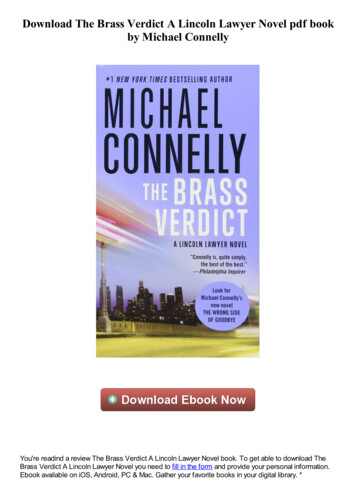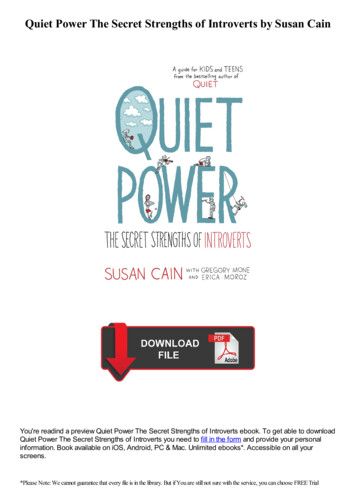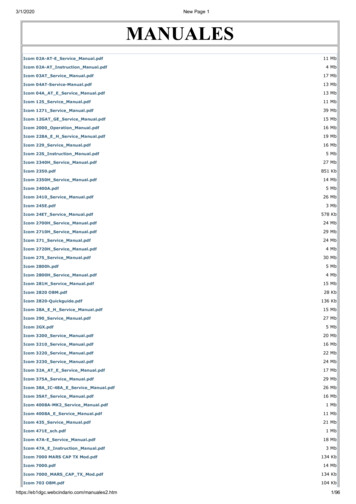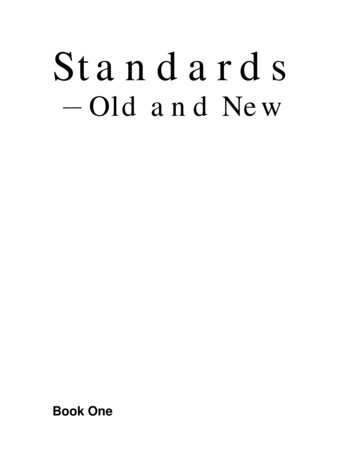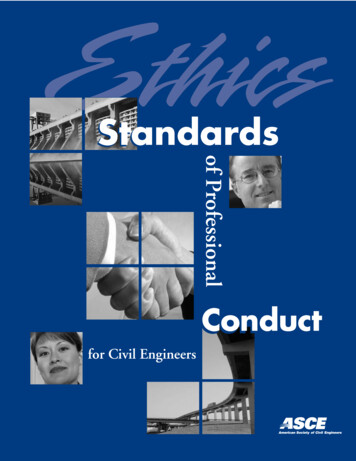
Transcription
Ethicsof ProfessionalStandardsConductfor Civil Engineers
Standards ofProfessionalConductAmerican Society of Civil EngineersApril 03, 2000
Table of ContentsSECTION 1 — Purposeof Standards of Professional ConductSECTION 2 — DefinitionOf Key Terms. . . . . . . . . . .1. . . . . . . . . . . . . . . . . . . . . . . . . . . . . .1SECTION 3 — Guidelines . . . . . . . . . . . . . . . . . . . . . . . . . . . . . . . . . . . . . . . . . . . .21.2.3.4.5.6.7.8.9.10.11.12.13.14.15.Conflict of Interest . . . . . . . . . . . . . . . . . . . . . . . . . . . . . . . . . . . . . . . . . . . . .2Ensuring Legal Compliance . . . . . . . . . . . . . . . . . . . . . . . . . . . . . . . . . . . . . . .2Employee and Public Safety . . . . . . . . . . . . . . . . . . . . . . . . . . . . . . . . . . . . . . .2Workplace Quality . . . . . . . . . . . . . . . . . . . . . . . . . . . . . . . . . . . . . . . . . . . . . .2Use and Protection of Employer’s Assets . . . . . . . . . . . . . . . . . . . . . . . . . . . .2Maintaining Accurate and Complete Records . . . . . . . . . . . . . . . . . . . . . . . . . .3Gifts, Meals, Services, and Entertainment . . . . . . . . . . . . . . . . . . . . . . . . . . . .3Confidential or Proprietary Information . . . . . . . . . . . . . . . . . . . . . . . . . . . . .3Outside Employment / Activities . . . . . . . . . . . . . . . . . . . . . . . . . . . . . . . . . . .4Purchases of Goods and Services . . . . . . . . . . . . . . . . . . . . . . . . . . . . . . . . . .4Bribes and Kickbacks . . . . . . . . . . . . . . . . . . . . . . . . . . . . . . . . . . . . . . . . . . . .5Relationships with Competitors . . . . . . . . . . . . . . . . . . . . . . . . . . . . . . . . . . . .5Relationships with Clients, Outside Contractors, and Consultants . . . . . . . . . .5Environmental Protection . . . . . . . . . . . . . . . . . . . . . . . . . . . . . . . . . . . . . . . .5Whistle Blowing . . . . . . . . . . . . . . . . . . . . . . . . . . . . . . . . . . . . . . . . . . . . . . . .5SECTION 4 — Communicatingand Monitoring. . . . . . . . . . . . . . . . . . . . . . . .71. The Role of the ASCE Member . . . . . . . . . . . . . . . . . . . . . . . . . . . . . . . . . . .72. The Role of Management . . . . . . . . . . . . . . . . . . . . . . . . . . . . . . . . . . . . . . . .83. The Role of the Committee of Professional Conduct . . . . . . . . . . . . . . . . . . .8SECTION 5 — EthicalDecision Making GuidelinesAPPENDIX — ASCE’sCode of Ethics1.2.3.4.5. . . . . . . . . . . . . . . . . . . .9. . . . . . . . . . . . . . . . . . . . . . . . . . . . . . .10EdictCode of Ethics . . . . . . . . . . . . . . . . . . . . . . . . . . . . . . . . . . . . . . . . . . . . . . . .10History . . . . . . . . . . . . . . . . . . . . . . . . . . . . . . . . . . . . . . . . . . . . . . . . . . . . . .10Fundamental Principles . . . . . . . . . . . . . . . . . . . . . . . . . . . . . . . . . . . . . . . . .11Fundamental Canons . . . . . . . . . . . . . . . . . . . . . . . . . . . . . . . . . . . . . . . . . . .11EnforcementEnforcement of the Code . . . . . . . . . . . . . . . . . . . . . . . . . . . . . . . . . . . . . . .11Code of EthicsFundamental Principles . . . . . . . . . . . . . . . . . . . . . . . . . . . . . . . . . . . . . . . . .13Fundamental Canons . . . . . . . . . . . . . . . . . . . . . . . . . . . . . . . . . . . . . . . . . . .13Guidelines to Practice under the Fundamental Canons of Ethics . . . . . . . . .13
SECTIONof Standards of1PurposeProfessional ConductThe Standards of Professional Conduct were developed to provide individuals or small businesses that don’t have the resources or a complete set of principles and guidelines to govern the dayto-day aspects of ethics practices in our profession. These guidelines reinforce ASCE’s Code ofEthics, which all ASCE members are expected to practice.SECTION2Definition of Key TermsStakeholders:All constituencies with an interest in the success of the Employer,including Clients, ASCE, ASCE members, other employees, Regulators,and the general public, are stakeholders.Conflict of Interest:A conflict of interest arises in any situation in which an ASCE memberuses his or her contacts or position in his or her employment toadvance his or her private business, financial interests, or that of familyand friends, whether or not at the expense of the Employer.Significant Professional Relationship:A significant professional relationship is one thatis so substantial it creates a potential risk of interference with theemployee’s independent exercise of judgment.Family Members:Family members include spouse, children, parents, siblings, grandparents,in-laws, or any person sharing the same home with the ASCE member.Insider Trading:Trading (buying or selling securities) based on confidential informationabout your company or another company that is obtained through youremployment before the information is released publicly.Confidential or Proprietary Information:Information that is the property of theEmployer and is intended to be treated as private.Outside Employment: Working for any Employer, including yourself, other than for yourEmployer.Bribes:A gift or favor given or promised with the intent to corrupt judgment orconduct.Kickback:The return of a portion of a payment in return for special treatment notafforded to all.Harassment:Repeated irritating, undesirable, and offensive conduct from one personto another of a ridiculing or offensive nature.1
SECTION3GuidelinesASCE members who violate ASCE’s Standards of Professional Conduct are subject to disciplinary action up to and including removal or suspension from ASCE.1. Conflict of InterestAll professional and business decisions shall be made in the best interest of the Employer orprofession. Conflicts of interest can arise in many situations, some of which may be basedsimply on perceptions. Playing favorites or engaging in conflicts of interest, whether in practice or just appearance, is contrary to the expectation of fair and ethical treatment to whichwe are entitled. ASCE members are expected to avoid any relationship, influence, or activitythat might be perceived to or actually impair their ability to make objective and fair decisionswhen performing their jobs. When in doubt, they should share the facts of the situation withtheir leadership and resolve the conflict.2. Ensuring Legal ComplianceASCE members shall conduct their actions in accordance with applicable laws and regulations. Compliance with the law does not comprise our entire ethical responsibility, but it isabsolutely essential for performance of our duties. We shall be truthful and responsive withregulatory bodies or recognized governmental agencies that establish rules or oversee ouroperations.3. Employees and Public SafetyASCE members shall be committed to maintaining a drug and alcohol free, safe, and healthywork environment. They shall comply with applicable environmental, health, and safety lawsand regulations. Violations of safety rules or conditions that endanger the welfare of otheremployees, contractors, clients, or the general public should be reported immediately toappropriate authorities.4. Workplace QualityASCE desires a workplace where its members feel respected, satisfied, and valued.Harassment, discrimination, or sexist behavior of any kind is unacceptable (in many cases itis illegal), and it shall not be tolerated. Providing a safe and productive environment thatensures ASCE members the opportunity to achieve excellence in the workplace is theresponsibility of every ASCE member.5. Use and Protection of Employer’s AssetsYour Employer has many valued assets, such as cash, physical property, proprietary tradesecrets, and confidential information. Protecting these assets against loss, theft, and misuse isevery employee’s responsibility. Your Employer’s property may not be used for personal benefit, nor may it be lent, sold, disposed of, or given away without proper authorization. Wherecertain facilities are made available to ASCE members for personal use (e.g. computers),rules applicable to the specific use of those facilities shall apply.2
Your Employer’s assets shall be used for proper purposes during and following employmentwith that Employer. The removal from your company’s facilities of the Employer’s assets isprohibited unless specifically authorized. Improper use includes unauthorized personalappropriation (theft) or use of your Employer’s assets or resources, including computerequipment, software, and data.The Internet and electronic mail are valuable resources available to employees in the performance of job-related duties. The Internet should not to be used to view, copy, save, ordistribute unauthorized material. Electronic mail should not be used in the conduct of outside employment or personal business activities.6. Maintaining Accurate and Complete RecordsThe importance of maintaining accurate and complete records cannot be overstated.Transactions between the member’s company, its affiliates, its clients, and its vendors, regulators, outside individuals, and organizations must be entered in the Employer’s books promptly, accurately, and honestly. Financial records should be maintained in accordance with generally accepted accounting practices, principles, and established Employer guidelines.Misrepresenting facts or falsifying records is illegal, shall not be tolerated, and should resultin disciplinary action.7. Gifts, Meals, Services, and EntertainmentIt is improper for an ASCE member or family member to knowingly request, accept, or offeranything that could be construed as an attempt to influence the performance of duties or tofavor a customer, supplier, or competitor that is contrary to the best interests of theEmployer, its clients, or the profession. Generally, this includes receipt of gifts, payments, travel, or other benefits of greater than nominal value from any existing or potential customers,suppliers, competitors, or other special interest groups that are not in the best interests of theEmployer, its clients, or the profession. Loans of any sort should be strictly prohibited.Gifts of nominal value motivated by commonly accepted business courtesies may be accepted or given, but not if accepting or giving such gifts could cause the perceived or actual prejudice toward, or obligation to, the donor.Before accepting any gift or gratuity, the ASCE member or family member should considerwhether she or he has the opportunity to influence decisions about the Employer’s businesswith the donor or if acceptance could be perceived by others as creating an obligation to thedonor. If so, the gift or gratuity should not be accepted. When in doubt, share the facts ofthe situation with the leadership of your Employer.Meals provided by an existing or potential client, supplier, or competitor may be acceptableif they are for a business purpose, are reasonable, and are not repetitive.8. Confidential or Proprietary InformationIn the course of normal professional activities, ASCE members may have access to information that is proprietary, confidential, privileged, or of competitive value to the Employer. Inaddition, clients and even competitors may sometimes divulge information to ASCE members that is proprietary to their business. ASCE members must respect these confidences byprotecting the confidentiality and security of documents and related information.3
The use or disclosure of confidential information is for the Employer’s purposes only andnot for personal benefit or the benefit of others. To preserve confidentiality, the disclosureand discussion of confidential or competitive information should be limited to those needing to know the information.Lists or other information concerning your Employer’s personnel, clients, suppliers, or shareholders are considered privileged information and are not to be disclosed to others, except asrequired by government agencies and with appropriate employer’s approval.ASCE members must also guard against improper disclosure of competitive business strategies and plans, special methods of operation, and other information that is of competitivevalue to the Employer, competitors, clients, or its suppliers. If an appropriate official of theEmployer determines that disclosing such information furthers the Employer’s business purposes, licensing agreements or other arrangements may be used to protect the Employer’srights and interests. If an ASCE member is unsure whether information is of a confidentialnature, the ASCE member is advised to seek guidance from the leadership of the Employer.Information which is not available to the general public should not be discussed with outsiders, including family, friends, or acquaintances. Examples of items that are available to thepublic and may be openly discussed are annual reports, quarterly reports, annual or periodicfilings once filed, and press releases issued by the Employer.9. Outside Employment/ActivitiesOutside employment or business activities not related to the Employer must not conflictwith the employee’s ability to properly perform his or her work. Such employment or business activity should not create or appear to create a conflict of interest. Company time orfacilities, including telephone or electronic media, may not be used in the conduct of outsideemployment or personal business activities without the Employer’s express approval.Employment with an outside organization that has no actual or potential significant businessrelationship with the Employer is allowable so long as it does not interfere with job performance and safety. ASCE members must notify Employer in writing of current or contemplated outside employment. The Employer shall evaluate the specific circumstances and provideguidance on the issue of conflict of interest.10. Purchases of Goods and ServicesThe acquisition of goods and services from external vendors may constitute a significantportion of the Employer’s annual expenditures. Adherence to established guidelines andpractices governing the procurement function are critical to ensure compliance with all commercial and legal requirements and to maximize the value received from these expenditures.It is the responsibility of ASCE members to work to maintain the good name of theEmployer, to develop and maintain good business relations between the Employer and itsvendors, and to keep in mind that personal contacts form much of the basis for the supplier’s opinion of the Employer. All sales and purchases by the Employer should be based onprice, service, quality, and the consistency and dependability of the basic business relationships underlying each transaction.The Employee shall not purchase goods or services from family members except in4
instances where it makes good business sense. When business needs require a related partypurchase, the Employer must be made aware of the relationship to ensure that no conflict ofinterest exists. In no instance may the related ASCE member be the final decision-maker.Most of the Employer’s transactions relating to purchasing should be confidential, especiallywith regard to vendors. It is unethical, as well as damaging to the Employer, to allow proprietary information about one vendor’s quotation or pricing structure to pass to another vendor. Care should be taken to ensure the protection of this information, and ASCE membersshould maintain an awareness of the ways this situation could inadvertently occur and takesteps to avoid it. Discussions between the Employer’s personnel and vendor representativesregarding product or vendor preferences should be avoided.11. Bribes and KickbacksASCE prohibits its members to offer or accept bribes, kickbacks, and other similar payoffsand benefits to or from suppliers, regulators, government officials, trade allies, or customers.As stated in guideline #7, ASCE members and agents should also be prohibited from givingor receiving, directly or indirectly, anything of a significant value to, or from, an outsidesource in connection with a transaction entered into by the Employer. To offer or acceptbribes or kickbacks is a crime, both morally and legally, and could result in disciplinary actionup to and including dismissal.12. Relationships with CompetitorsASCE members should be aware that the Employer may be in a competitive environment.Discussions with existing or potential competitors regarding common issues should be conducted with care taken to protect all Employer information of a sensitive or proprietarynature that may benefit another party.13. Relationships with Clients, Outside Contractors, and ConsultantsClients, contractors, and consultants should be treated honestly, without unfair discrimination or deception, in a manner conforming to local, state, and national laws, and consistentwith good business practice. ASCE member should not make misleading or false remarksabout other employers, including the Employer’s competitors.14. Environmental ProtectionThe Employer and the ASCE member shall comply with both the letter and the spirit ofapplicable environmental laws and foster an open and constructive relationship with regulatory agencies, environmental groups, other ASCE members, and citizens with respect toenvironmental issues. ASCE members who are aware of situations in which the Employermay not be complying with environmental laws or is improperly handling, disposing of, orotherwise discharging any toxic or hazardous substance should immediately contact theEmployer.15. Whistle Blowing“Whistle blowing” is when an employee reports an employer who is breaking the law.Employees who blow the whistle on their employers are protected by law. If they are fired orotherwise retaliated against for whistle blowing, they can take legal recourse. To actually5
whistle blow, the employee must report the illegal act outside the company to a governmentor law-enforcement agency. If the employee just complains to someone inside the company,that is not whistle blowing, and the employee is not protected by the whistle blower laws.It is not necessary that the employer actually break the law. The employee could blow thewhistle on something that isn’t illegal in the first place. The employee is still protected fromretaliation or termination. However, the employee must believe that he or she is reporting aviolation of the law, and the employee’s belief must be reasonable.If the employee has reported the allegedly illegal activity to a government or law enforcement agency, he or she is protected. The employer cannot retaliate against the employee. Theemployer cannot fire the employee for the whistle blowing. The employer cannot mistreatthe employee for whistle blowing.This does not mean that after whistle blowing, the employee cannot be fired for any reason.The employer can continue to treat the employee like any other employee. But the employercannot treat the employee differently because of the whistle blowing.6
SECTION4Communicating and MonitoringThis Standards of Professional Conduct (“Standards”) will be distributed or made available to allASCE members. ASCE members in management positions are suggested to provide their professional staff with a copy of the Standards.There are several actions that ASCE members can take to assure that their commitment to ethical business conduct pays off in practice.1. The Role of the ASCE memberThe Employer usually provides a mechanism to help employees handle difficult judgmentdecisions, those “gray areas” where it is often hard to differentiate right from wrong. NoASCE member should be uncomfortable in handling a question involving proper professional conduct.If you are uncertain about what is proper ethical conduct in a particular situation, if you areconcerned about your own conduct, or if you believe that a fellow ASCE member may haveviolated the Standards, you should contact one of the following:IYour immediate supervisor, owner, or department headIASCE’s Committee on Professional Conduct through ASCE’s legal counsel.When you communicate a question of ethics/professional conduct to one of the above:IYou shall be treated with dignity and respect.IYour concerns shall be seriously addressed and you shall be informed of the outcome.IYour communications shall be protected to the greatest extent possible:GGGGGQuestions of guidance or clarification may be asked anonymously.A report of possible misconduct requires identification of the ASCE membermaking the report.The identity of an ASCE member who in good faith reports violations of theStandards shall be treated as confidential, and no reprisal should be taken againstthem.Disciplinary action shall be taken against anyone who retaliates, either directly orindirectly, or encourages others to do so, against any ASCE member who reportsa violation of the Standards.The identity of the reporting person shall only be disclosed on a “need toknow” basis.7
2. The Role of ManagementNormally, the ASCE member should discuss the matter first with his or her immediatesupervisor or department head, who may provide valuable insight and allow for resolutionwithin the appropriate work unit.3. The Role of the ASCE Committee on Professional Conduct (CPC)The Ethics Referral Sub Committee consists of three ASCE members who report to or aremembers of the CPC. The subcommittee shall be charged with the responsibility of monitoring compliance with the Standards. The subcommittee shall perform inquiries in a fair andunbiased manner and shall recommend actions necessary for resolution. Every effort shall bemade to resolve issues brought before the subcommittee in an expeditious manner. The subcommittee shall only have access to the identity of the person reporting suspected misconduct on a “need to know” basis.8
SECTION5Ethical Decision Making GuidelinesThe general guidelines presented are provided to help ASCE members, member-owned companies,and others better understand what should be expected from them in their professional dealings.In making decisions, all ASCE members are encouraged to use the following guidelines (PLUS):PoliciesLegalUniversalSelfIs it consistent with your Employer’s policies, procedures, and guidelines andASCE’s Code of Ethics?Is it acceptable under applicable laws and regulations?Does it conform to the universal principles/values that your Employer andthe profession have adopted?Does it satisfy your own personal definition of right, good, and fair?If you are still unsure about whether or not to act, consult the leadership of your organizationfor guidance, as well as the ASCE Committee on Professional Conduct.The preceding policies are intended to re-emphasize the commitment that ASCE and all of itsmembers have toward integrity and ethical business conduct. The Standards of ProfessionalConduct simply documents the good judgment and honesty with which ASCE members havealways conducted their daily business.Acknowledgements:The preceding “Standards of Professional Conduct” was prepared by ASCE’s Committee onPractice Guidelines. It was modified from Sierra Pacific Power’s “Standards of BusinessConduct.”9
APPENDIXA ASCE Code of EthicsEdict1. Code of EthicsASCE is committed to the highest levels of ethical conduct. To preserve the high ethical standards of the civil engineering profession, the society maintains and enforces a code of ethics.11. Applicability: All Society members must subscribe to the Society’s Code of Ethics (the“Code”). ASCE Constitution, Article II, § 1. (Attachment 1, ASCE Code of Ethics,1998).12. Duty: It is the duty of every Society member to report promptly to the Committee onProfessional Conduct any observed violation of the Code. ASCE Rules of Policy andProcedure, Article III, § 1.1.2. HistoryThe code was first adopted in 1914 and has been amended numerous times since.11. Background: From 1877 to 1914, the Society’s Board of Direction believed that ethicswas a matter of an engineer’s personal responsibility and honor and not appropriate for awritten code. In response to a motion concerning professional conduct in 1877, the Boardresolved “[t]hat it is inexpedient for the Society to instruct its members as to their dutiesin private professional matters.” In 1914, a special committee of the Board of Directionwas appointed to a draft a Code. The original Code contains six principles. It was approvedby letter ballot of the membership and was adopted on September 2, 1914. (Attachment2, ASCE Code of Ethics, 1914).12. Original Scope: The original Code focused largely on relationships of engineers withtheir clients or with other engineers, rather than responsibilities to the public.13. Guidelines to Practice: On April 10-11, 1961, the Board of Direction adopted theGuidelines to practice, as an adjunct to the Code.14. Fundamental Principles: The fundamental Principles were approved by the Engineers’Council for Professional Development on September 30, 1963, and endorsed by theASCE Board of Direction on May 11-12, 1964. A revised version was approved by theASCE Board of Direction on April 12-14, 1975.15. Antitrust: Periodically, the Code has been the subject of Department of Justice antitrustinvestigations.110
3. Fundamental PrinciplesEngineers uphold and advance the integrity, honor, and dignity of the engineeringprofession by:1. Using their knowledge and skill for the enhancement of human welfare and the environment;2. Being honest and impartial and serving with fidelity the public, their employers and clients;3. Striving to increase the competence and prestige of the engineering profession; and4. Supporting the professional and technical societies of their disciplines.4. Fundamental Canons1. Engineers shall hold paramount the safety, health, and welfare of the public and shall striveto comply with the principles of sustainable development in the performance of their professional duties.2. Engineers shall perform services only in areas of their competence.3. Engineers shall issue public statements only in an objective and truthful manner.4. Engineers shall act in professional matters for each employer or client as faithful agents ortrustees, and shall avoid conflicts of interest.5. Engineers shall build their professional reputation on the merit of their services and shallnot compete unfairly with others.6. Engineers shall act in such manner as to uphold and enhance the honor, integrity, and dignity of the engineering profession.7. Engineers shall continue their professional development throughout their careers and shallprovide opportunities for the professional development of those engineers under theirsupervision.Enforcement5. Enforcement of the CodeThe board of direction or the executive committee may take disciplinary action against ASCEmembers who violate the code.11. Complaints: Charges of unethical conduct may be brought by Society members and nonmembers. Complaints are referred to the Society’s Committee on Professional Conduct(“CPC”) for investigation.12. Investigation: CPC comprises at least four past members of the Board of Direction.ASCE Bylaws, Article VIII, §2 (a).1A. Composition: CPC comprises at least four past members of the Board of Direction.ASCE Bylaws, Article VIII, §2 (a). There are currently five members on the commit11
tee, including at least one member from each zone. CPC members are appointed to athree-year term.1B. Investigation: CPC investigates possible ethics infractions in accordance with theSociety’s Procedures for Professional Conduct Cases (Attachment 5, Procedures forProfessional Conduct Cases), Article III of the Society’s Bylaws, and ProfessionalConduct Precepts. (Attachment 6, Professional Conduct Precepts). During the investigation phase, CPC acts like a grand jury. If CPC finds sufficient evidence to warrantdisciplinary action, the case is scheduled for hearing before the Executive Committee.1Section Role: In conducting professional conduct investigations, CPC may solicit assistance from local Society members or Sections. (Attachment 7, Role ofASCE Sections in Professional Conduct Cases).13. Executive Committee Proceeding. The Executive Committee considers proceedingsfor the discipline of a Society member upon the (a) recommendation of CPC, or (b) written request of 10 or more Society members. ASCE Bylaws, Article III, § 1 (a); Proceduresfor Professional Conduct Cases.1A. Due Process: Hearings are conducted in accordance with the Procedures forProfessional Conduct Cases. Due process is afforded to the member, including reasonable notice of the charges and the hearing; fair opportunity to hear the evidence,question witnesses, and refute the evidence; and a hearing before an unbiased panel.1B. Role: The Executive Committee acts as Judge or Jury. At this point, a CPC memberserves a function similar to a prosecutor.1C. Disciplinary Action: Upon finding a violation of the Code, the ExecutiveCommittee may take disciplinary action, other than expulsion, by a majority vote. Suchaction typically includes a letter of admonition or a suspension from membership. Themost severe penalty is expulsion from the Society. The Executive Committee cannotexpel a member, but can make a recommendation to the Board of Direction that themember be expelled.14. Board of Direction Proceeding. If the Executive Committee votes to recommendexpulsion, the case is scheduled for hearing before the Board of Direction, with the samedue process protections afforded at the Executive Committee hearing. A decision to expelthe member requires a 75 percent vote of the Board. The Board may impose lesser disciplinary actions upon a majority vote. ASCE Bylaws, Article III; Procedures forProfessional Conduct Cases.15. Publication. The Executive Committee and Board of Direction have discretionaryauthority to publish the action, with or without the name of the member. Such notice istypically published in Civil Engineering Magazine. The Executive Committee and Boardof Direction also have
to-day aspects of ethics practices in our profession. These guidelines reinforce ASCE's Code of Ethics, which all ASCE members are expected to practice. Definition of Key Terms Stakeholders: All constituencies with an interest in the success of the Employer, including Clients, ASCE, ASCE members, other employees, Regulators,
